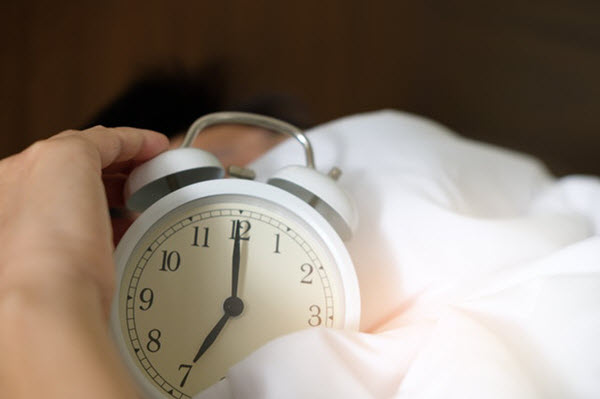How to Reset Body Clock Fast: 5 Circadian Rhythm Tips to Maximize Your Day
By Kayla Matthews
June 18, 2018 • Fact checked by Dumb Little Man

Like the moon and seasons, your body follows a rhythm known as the circadian rhythm. This cycle controls numerous aspects of your physical, emotional, behavioral and mental well-being each day. Going against the rhythm of this cycle makes your days harder and your productivity lower.
Knowing how to rest body clock fast can help you regain your energy and motivation to conquer your daily tasks and that's exactly what you'll discover in this article. But before that, let's understand the basics first.
What Is Circadian Rhythm?

That sudden need for a nap in the middle of the afternoon is not just your imagination. It's your natural circadian rhythm lowering your body temperature to prepare you for sleep. The same happens in the middle of the night when you reach your deepest sleep.
The hypothalamus operates the circadian rhythm in your body and if you disrupt it, it throws off your body's sleep cycle. That makes it harder to stay awake during the day and fall asleep at night.
Your biological clock runs your circadian rhythm. However, your environment dramatically affects it. What you do each day can either throw it off or get it back on track.
Know Your Chronotype
Everyone's circadian rhythm is slightly different. To take advantage of it, you need to know whether you're naturally a night owl or a morning lark. This is called your chronotype.
Matching your activity to your chronotype will enable you to tap into your circadian rhythms. If you're naturally a night owl, your circadian rhythm shifts toward more wakefulness at night. Morning larks have better productivity in the morning when they feel more awake.
Chronotype is significant and not something you should fight against. In fact, fighting your natural rhythm could put you at risk for making more unethical decisions. Tiredness increases the difficulty in making hard choices. It's easier to just give into temptations, such as having that extra slice of cake, if you're not at your mental peak.
Change Lighting

Light plays an integral role in controlling your circadian rhythm. In the morning, get plenty of sunlight within two hours of waking.
Keep yourself exposed to bright lights or sunlight throughout the day. At night, decrease the amount of light you expose yourself to. That helps your body ease itself into sleep.
Additionally, you will need to avoid exposure to blue light from screens. Phones, computers, and televisions all emit blue light which promotes wakefulness.
In a recent study, participants exposed to blue light for six and a half hours had less melatonin production. Their circadian rhythms also shifted by three hours, double the shift from green light exposure.
If removing your devices isn't possible, choose night modes for your electronics to reduce both the blue light they emit and their effect on your circadian rhythm.
Alter Your Schedule
Once you know if you're a night owl or a morning person, adjust your schedule to coincide with the time you're most productive.
Morning people should plan focused tasks in the morning. Night owls should schedule mundane tasks for the morning, such as answering emails. Leave jobs that require heavy focus for the afternoon. Collaborate with others just before lunch which is when research claims most people get an energy boost.
If possible, arrange for a short nap around the natural dip in energy around 3 p.m. Some employers even encourage this for employees and offer napping rooms. If a nap is out of the question, consider scheduling simple tasks for whenever your energy is at its lowest, regardless of your chronotype.
Regulate Your Eating
Your body demands regulation. It doesn't care if it's a weekend or workday. That means you should keep the same sleeping and eating schedule seven days a week to prevent a disruption in your circadian rhythm.
Avoid caffeine in the afternoon. And stay away from sugar, alcohol, and heavy meals at night.
Eating late in the evening may prevent you from losing weight. Insulin levels also do not regulate well late at night.
In a study of 420 overweight people, two groups ate the same amount of food. One of those groups ate earlier in the day, while the other ate later. The second group had a harder time losing weight.
With that, try to stick with regular eating earlier in the day to help your body use the food in the best way possible.
Practice Good Sleep Hygiene

Your sleeping habits are critical for maintaining your circadian rhythm. Even just one hour of sleep disruption can have dire consequences. Studies link an increase in traffic accidents with the time change to daylight-saving time. Jet lag and shift work also have serious impacts on your circadian rhythm.
To reset your internal clock, aim to get the same amount of sleep every night. You can do that by following these tips:
- First, create a routine to relax yourself before bed.
- Keep your bedroom cool and comfortable.
- Don't use your television, computer or cell phone before bed.
- Turn your bedroom clock to face the wall so you don’t feel tempted to check the time in the middle of the night.
These habits encourage deeper sleep which can help regulate your circadian rhythm.
See Also: Five Ways of Overcoming the Problem of Getting Sleep
Reset Yourself to Maximize Your Day
Get the most out of life by hacking your circadian rhythm. You'll feel better and get more done. It all starts with finding your chronotype and adapting your schedule to the regular cycle of your circadian rhythm.
Kayla Matthews
Senior writer @makeuseof. Bylines on @theweek, @motherboard, @technobuffalo and @venturebeat. Interested in personal and professional development and continued self-improvement.

